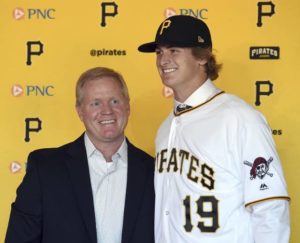If Quinn Priester wasn’t playing baseball right now, he’d probably be working in aviation. The Pittsburgh Pirates 2019 first round draft pick, who looks up to Chicago Cubs ace Kyle Hendricks as his pitching role model, has Illinois aviation history in his blood.
His great-grandfather, George J. Priester, founded the company that is known today as Priester Aviation, a private jet charter and aircraft management service located at Chicago Executive Airport in northwest suburban Wheeling, IL.
He, along with his son Charlie, built Palwaukee Airport (now known as Chicago Executive) into what it is today. Before the Priester family bought and developed it, there wasn’t much to it. Esther Noffke, Quinn’s great-grandmother, was in the Women Airforce Service Pilots.
The Women Airforce Service Pilots was a civilian women pilots’ organization, whose members were United States federal civil service employees. Members of WASP became trained pilots who tested aircraft, ferried aircraft, and trained other pilots.
I had an exclusive with Andy Priester, Quinn’s Dad, who has been leading the company since 2013. We spoke at Priester Aviation’s Hangar One, which I’ll let him describe in his own words.
“As we thought about what could we wind up doing about building relationships, especially during covid and all the rest of those things, something I wanted to do was build this lounge, and we call it hangar one,” Andy Priester said.
“And we created a space for team members to come, hang out, watch some tv, grab a beer, have lunch, we do events up here. We wanted to make sure this space is reflective of the company, honors the heritage of the company. This is where we came from, and this is where we’re going.”
There is a conference room at Hangar One named after Esther, and it was there that Andy told me her story.
“During the war she would ferry bombers back and forth from the east coast to the west coast, so the men could take them to the war, but she never received the recognition that she deserved, because she was a huge part of the growth of the airport and the company.
“She had 1000s of pictures, and she was basically our historian…President Obama called all the living WASPs, and brought them out to Washington.
In describing his grandfather George, Andy said:
“He was a good aircraft mechanic, started fixing planes, and early in his career he came up with the term, flying as a business tool, and he had this vision, during a day when people were barnstorming, and people were flying around in leather helmets and goggles, of what aviation would become.”
The company’s website describes George’s vision being brought to reality:
“After starting the flight school and buying the airport, George’s vision is realized with increased business aviation activity. He expands the business to include FBO services and jet charter operations with his son Charlie who goes on to obtain an ATP rating and logs more than 25,000 flight hours.
It also includes quotes from Charlie that describe how he developed the airport into what it is today:
“When we bought the airport from Parks College, who had used it during WWII as a military training field, there were two hangars plus some ‘T’ hangars, and the longest runway was 2,800 feet of cinders…The airport consisted of 108 acres, and there wasn’t a square inch of blacktop at the airport….
….The paving of the runways was all part of the development. We bought property piece by piece as we expanded the airport, and as part of that process, we started paving runways.”
Quinn Priester is currently having a very successful season with the Pirates’ AAA affiliate, the Indianapolis Indians.
Rated by some services as the fourth best overall prospect in the Pirates organization, and the top rated right handed pitching prospect in the NL Central division, it won’t be long until he makes his Major League debut.
You could easily see him with the parent club later this season. Quinn also said that he may possibly go back to school and learn how to fly once his playing career is over.
Paul M. Banks is the Founding Editor of The Sports Bank. He’s also the author of “Transatlantic Passage: How the English Premier League Redefined Soccer in America,” and “No, I Can’t Get You Free Tickets: Lessons Learned From a Life in the Sports Media Industry.”
He currently contributes to Ravens Wire, part of the USA Today SMG’s NFL Wire Network and the Internet Baseball Writers Association of America. His past bylines include the New York Daily News, Sports Illustrated, Chicago Tribune and the Washington Times. You can follow him on Linked In and Twitter.







